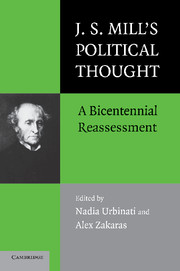Book contents
- Frontmatter
- Contents
- List of Contributors
- Introduction
- PART ONE LIBERTY AND ITS LIMITS
- PART TWO DEMOCRACY AND THE INDIVIDUAL
- 6 Bureaucracy, Democracy, Liberty: Some Unanswered Questions in Mill's Politics
- 7 Mill in Parliament: When Should a Philosopher Compromise?
- 8 John Stuart Mill, Individuality, and Participatory Democracy
- 9 Mill's Neo-Athenian Model of Liberal Democracy
- 10 John Stuart Mill on Education and Democracy
- PART THREE BEYOND NATIONAL BORDERS
- Bibliography
- Index
10 - John Stuart Mill on Education and Democracy
Published online by Cambridge University Press: 08 January 2010
- Frontmatter
- Contents
- List of Contributors
- Introduction
- PART ONE LIBERTY AND ITS LIMITS
- PART TWO DEMOCRACY AND THE INDIVIDUAL
- 6 Bureaucracy, Democracy, Liberty: Some Unanswered Questions in Mill's Politics
- 7 Mill in Parliament: When Should a Philosopher Compromise?
- 8 John Stuart Mill, Individuality, and Participatory Democracy
- 9 Mill's Neo-Athenian Model of Liberal Democracy
- 10 John Stuart Mill on Education and Democracy
- PART THREE BEYOND NATIONAL BORDERS
- Bibliography
- Index
Summary
Introduction
In this chapter, I explore John Stuart Mill's philosophy of education and its connection and intersection with democracy, within the context of his distinctive form of utilitarianism and his egalitarian liberalism. Mill's writings are notably attentive to educational matters, and it is striking just how many of his works emphasize the themes of education and democracy. Mill's philosophy is frequently invoked in discussions of democratic theory, and his writings offer useful tools to contribute to thorny contemporary questions about appropriate democratic education, democracy and disagreement, and democratic deliberation. The historical position of Mill's liberal political philosophy amplifies its capacity to contribute to these debates. Mill is a watershed figure in the history of liberalism: although there is room to disagree over the precise nature of Mill's role in the history of liberalism, there is general agreement that Mill manages, on one hand, to continue the pedigree of his liberal forebears while, on the other hand, expanding and reconstructing some of liberalism's core notions and principles. The result is a form of liberalism that is very current and that moves beyond the liberalism of Jeremy Bentham and James Mill.
C. B. Macpherson adeptly pinpoints one of Mill's points of departure when he notes that Mill has greater hopes for the future of democracy than his father James Mill does because the younger Mill saw in democratic institutions and practices a means of promoting human development.
- Type
- Chapter
- Information
- J.S. Mill's Political ThoughtA Bicentennial Reassessment, pp. 250 - 274Publisher: Cambridge University PressPrint publication year: 2007
- 9
- Cited by

